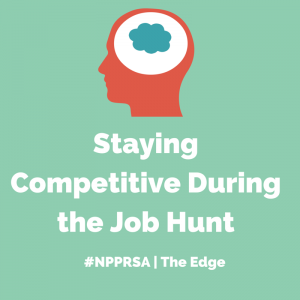 The process of applying for jobs can be overwhelming whether you’re a recent college graduate or a professional transitioning to a new role in an entirely different industry. As a college senior, it was very easy to feel defeated after applying to a number of jobs and not receiving positive feedback from the other end.
The process of applying for jobs can be overwhelming whether you’re a recent college graduate or a professional transitioning to a new role in an entirely different industry. As a college senior, it was very easy to feel defeated after applying to a number of jobs and not receiving positive feedback from the other end.
Juggling work as a full-time student, intern and hunting for a post-grad job was stressful. However, I eventually saw the light at the end of the tunnel when I received my job offer, and realized that my motivation stemmed from a deep understanding of my goals and maintaining my drive. Although applying for jobs can be a dreaded task, there are several strategies you can keep yourself competitive and motivated during the search:
1. Continue Gaining Experience. If you’re not employed while seeking a new position, it can be difficult for employers and recruiters to gain a serious interest in you. As frustrating as it sounds, you oftentimes need experience to gain experience. In order to practice the skills required for your dream job and continuing to build your resume, think about volunteering or interning while applying to jobs.
Volunteering for a non-profit whose cause you are genuinely passionate about is a great starting point to apply your skills. Interning for a startup or small consulting group in addition to guest blogging on relevant topics can also provide relevant experience.
2. Learn New Skills. For some candidates, transitioning to a completely different industry presents a challenge of proving to a recruiter or hiring manager that you have the right skill set to meet their needs. To overcome this, take advantage of workshops, seminars and boot camps that provide immersive crash courses in your field of interest. Check out free resources such as blogs, LinkedIn publications and online journals as well.
For more technical skill building, it’s helpful to watch videos either on YouTube or other subscription-based services. By showing that you’re committed to immersing yourself in a new industry, hiring managers will have a better chance of seeing you as a competitive candidate.
3. Stay Inspired. Like millions of people out there in the world, I have a list of ten dream companies that I hope to work for in my lifetime. From this list, I search for the roles I’m interested in at each company, and then do a bit of research on LinkedIn regarding the people who are in that particular department and the experience and skills needed for the position.
This effort truly motivates me to continue working towards my ultimate “dream job”. This could also potentially develop great leads and introductions via LinkedIn with people you would like to have informational interviews with to discuss your interests.
4. Network and Make New Contacts. Using referrals and connections is a great way to get your foot in the door of a company and get a chance at landing an interview. If you don’t have a wide network of contacts or are trying to gain contacts in a new industry, you can utilize LinkedIn, personal relationships and networking events to start building your connections.
On LinkedIn, you’re able to showcase your achievements and experience and reach out to the recruiters and directors of the department at the company you’re interested in. Here, you have the chance to introduce yourself and also ask for advice on how someone got to where they are now. Don’t forget to take it offline, though. Networking events, informational interviews and career fairs are great resources to make a personal connection with recruiters.
5. Set Measurable Goals. Project management can definitely apply to the process of applying for jobs. Organization, prioritization and time management are key to staying sane in this process. These elements all aid in the tracking of applications and interviews you have lined up.
With other tasks outside of only applying for jobs, it is important to set measurable goals. For example, it can be a very realistic goal to apply to three to five jobs a week depending on your other priorities, while dedicating the rest of your free time to attending networking events and learning new skills. Setting these reachable goals also prevent you from getting burnt out. Rather than doing too much to the point that you get discouraged, it’s beneficial to pace yourself especially in a stressful time like finding a new job.
What else have you done when applying for a new job?
 Jenelle Yee graduated from the University of Nevada with a bachelor’s degree in finance. Upon completing her degree, she relocated to Austin, Texas for a role in internal audit at a technology company. She has written pieces for Intern Queen Inc. and Lauren Berger Inc., providing career and internship advice to young professionals.
Jenelle Yee graduated from the University of Nevada with a bachelor’s degree in finance. Upon completing her degree, she relocated to Austin, Texas for a role in internal audit at a technology company. She has written pieces for Intern Queen Inc. and Lauren Berger Inc., providing career and internship advice to young professionals.
